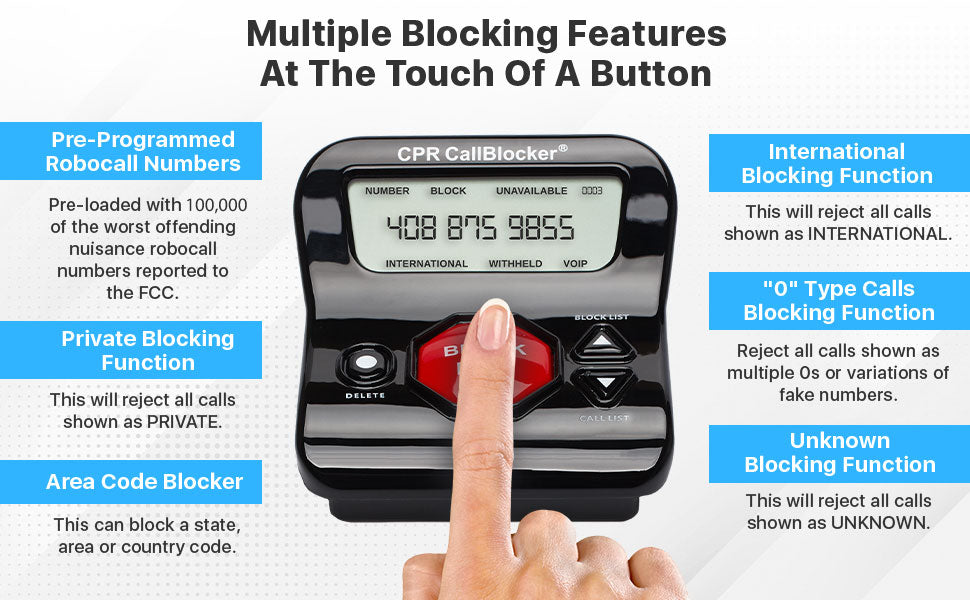In an increasingly digital healthcare landscape, remote support has become an essential part of modern medical care. Whether through telehealth appointments, remote monitoring, or virtual consultations, healthcare providers rely heavily on seamless communication to deliver timely and effective patient care. However, the rise in robocalls and scam calls threatens the efficiency and security of these remote services.
This blog explores how call blockers play a critical role in enhancing remote healthcare support by reducing disruptions, protecting patient information, and maintaining high standards of care and communication.

The Growing Importance of Remote Healthcare
The demand for remote healthcare services has surged in recent years, accelerated by factors such as the COVID-19 pandemic, advances in technology, and the need for more accessible healthcare options. Patients now regularly consult with doctors via video calls, receive updates through SMS, and manage chronic conditions using remote monitoring tools.
A 2023 report by McKinsey found that telehealth utilization has stabilized at levels 38 times higher than before the pandemic.
As remote care becomes a standard offering, ensuring reliable, secure, and uninterrupted communication is more crucial than ever.
Communication Challenges in Remote Healthcare
While telehealth has made medical support more accessible, it has also exposed new vulnerabilities:
Disrupted Communication from Robocalls
Patients and providers alike face a constant barrage of robocalls and spam calls. These unwanted interruptions can interfere with scheduled telehealth visits, urgent communications, or care coordination efforts.
Reduced Patient Engagement
If patients are bombarded with spam calls, they may begin to ignore incoming calls altogether—risking missed instructions, delayed care, and overall disengagement with their treatment plans.
Increased Security Threats
Robocalls often serve as phishing attempts, trying to obtain sensitive data such as insurance numbers, medical records, or financial details. Remote healthcare routinely shares data over digital channels, significantly increasing the risk of a breach.
Administrative Burden
Remote healthcare teams already juggle complex communication workflows. Sorting through spam calls adds unnecessary strain, taking time away from core medical and administrative duties.
Technology Fatigue and Confusion
For many patients—especially older adults—frequent spam calls can create confusion and anxiety about what communication is legitimate. This can worsen technology fatigue and hinder effective use of telehealth services.

How Call Blockers Improve Remote Healthcare Support
Call blockers offer a targeted, efficient solution to many of the issues plaguing remote healthcare communication. By filtering out scams and robocalls, they help both patients and providers focus on meaningful interactions.
1. Ensures Reliable Communication
Call blockers prevent robocalls from interrupting video consultations, follow-up calls, or alerts about medication or treatment changes. This leads to more consistent and uninterrupted remote care.
2. Boosts Patient Responsiveness
When patients know that incoming calls are trustworthy, they are more likely to answer, listen, and engage. This improves appointment attendance, medication adherence, and overall care outcomes.
3. Protects Patient Data
By blocking suspicious numbers and scam attempts, call blockers act as a first line of defence against phishing attacks. This helps protect patient data and ensures compliance with privacy regulations like HIPAA.
4. Reduces Stress on Healthcare Teams
Automated call blocking reduces the time staff spend filtering calls, allowing them to focus on delivering care and managing patient relationships. This boosts efficiency and morale across remote support teams.
5. Prevents Missed or Delayed Care
In emergency or time-sensitive situations, every second counts. By eliminating unnecessary call volume, call blockers ensure that vital communications are not missed or delayed due to spam interference.
Real-World Benefits of Call Blockers in Remote Care
Home Health Services:
Nurses and caregivers working remotely or making home visits depend on clear, secure phone communication. Call blockers help ensure they only receive relevant, legitimate calls, improving safety and efficiency.
Telehealth Providers:
Virtual care platforms benefit from reduced call disruptions, enabling smoother operations, better patient experiences, and fewer no-shows.
Chronic Condition Management:
Patients managing long-term health issues at home need consistent contact with care teams. Call blockers reduce distractions, improving focus and reliability in ongoing care conversations.
Conclusion
As remote healthcare continues to evolve, maintaining efficient, secure, and uninterrupted communication is vital. Robocalls disrupt workflows and threaten patient trust, privacy, and safety. Implementing call blockers is a proactive step that healthcare providers can take to safeguard their communication systems and deliver better care.
By investing in solutions like the CPR Call Blocker, organizations enhance their remote care capabilities, reduce operational inefficiencies, and—most importantly—create a more secure, supportive environment for both patients and professionals.

The CPR Call Blocker Solution
One of the most effective tools available for preventing scam calls is the CPR Call Blocker. Designed to protect both households and businesses, this innovative device can block thousands of scam numbers with the push of a button.
Unlike many other call-blocking solutions, CPR Call Blocker allows users to manually block unwanted numbers, giving them full control over their phone lines. Additionally, it pre-programs thousands of known scam numbers, guaranteeing users' protection from the start.
Households, particularly those with elderly individuals frequently targeted by phone scams, find peace of mind with CPR Call Blocker. Businesses benefit from reduced disruptions and improved productivity as fewer scam calls reach their phone lines.



